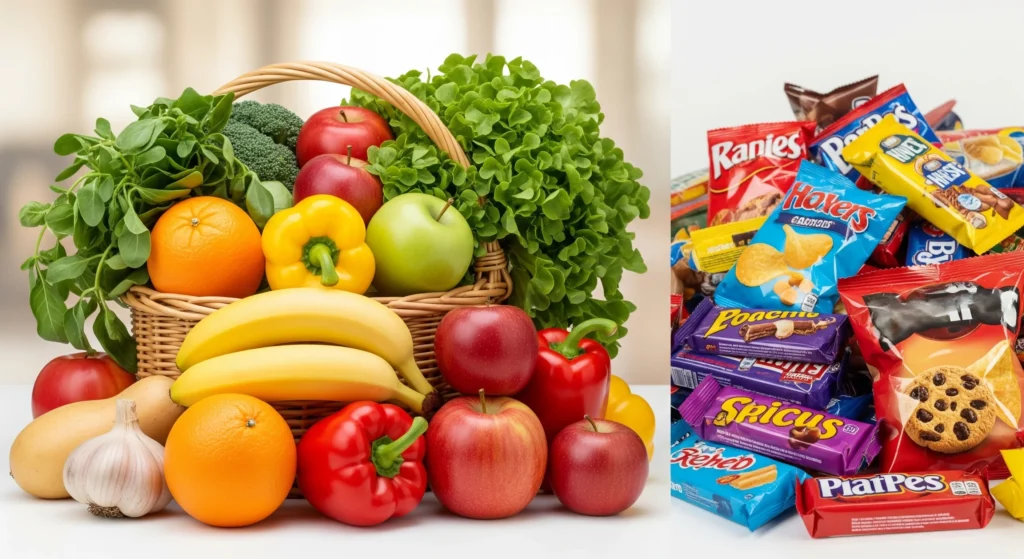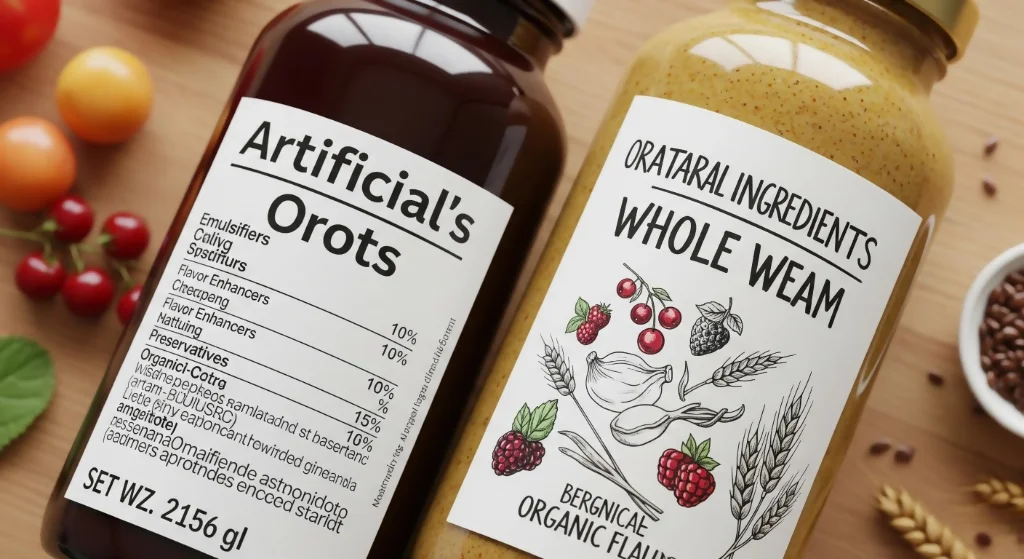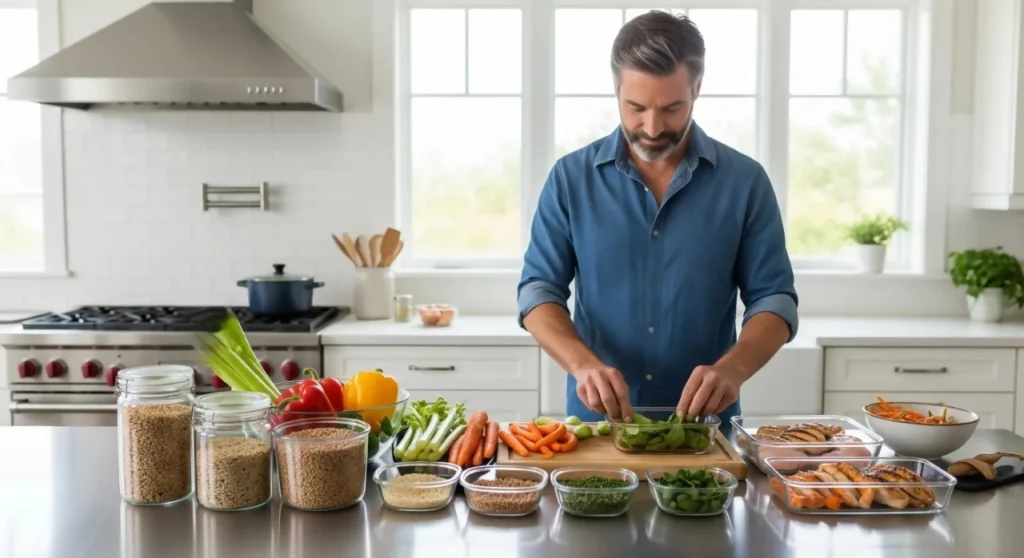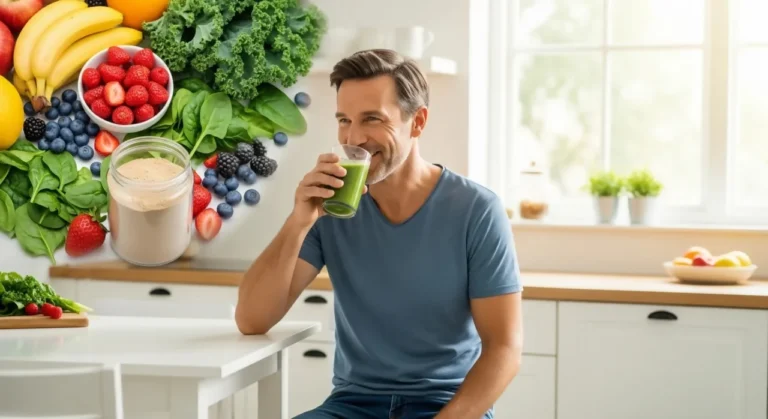whole foods vs processed foods: 6 Strong Reasons to Prefer Whole Foods

Introduction
Whole Foods vs Processed Foods: What we eat each day plays an integral role in our health, energy level, mood, and potentially how long we might live.
One of the hardest decisions can be choosing between whole foods vs processed foods. This is not too difficult as both are stocked on most supermarket shelves; however, they can be opposite when it comes to offering our bodies nutrients. Research from a 2022 study conducted by the National Institutes of Health revealed that the average adult does not consider eating more than recommended, and does not realize that over 60% of their caloric intake comes from ultra-processed foods (NIH.gov). This has some relation to the increasing prevalence of obesity, diabetes, and heart disease within society. Whole Foods vs processed foods
Now we will break down the six key differences between whole food and processed food. You will learn why swapping to whole foods can turn your health around and how to identify and avoid negative food products that are mandated in North America.
1. What is whole food, and what is processed food?
Whole food is food from nature, minimally processed at most. Fresh fruits and vegetables, whole grains, legumes, nuts, seeds, and lean meat.
On the other hand, processed foods have taken something whole and altered it. This can be the addition of preservatives, colors, flavors, as well as artificial ingredients, such as sugar, and synthetic materials. Whole Foods vs processed foods
Examples of Whole Foods
- Apples, carrots, spinach
- Brown rice, oats
- Fresh chicken, salmon
Examples of Processed Foods
- Instant noodles
- Potato chips
- Soda and candy bars
Whole foods contain nutrients in their natural state, whereas processed foods contain empty calories, sugar, and fat.
2. Nutrient Density: Quality vs Quantity
Whole foods are extremely nutrient-dense. The vitamins, minerals, antioxidants, and fiber found in whole foods truly nourish your body and help it to run at optimized function. For example, leafy greens are full of vitamin K for bones and folate for heart health.
Processed foods can be high in calories, but low in nutrients, as many processed foods are stripped of fiber and natural vitamins during processing, and then put synthetic additives in to compensate, which your body doesn’t uptake like naturally occurring nutrients.
Actionable Tip: Aim to fill 80% of your plate with whole foods, and treat yourself to processed foods sparingly.
Example: Replace sugary breakfast cereal with oats topped with fruit and nuts.

3. Additives and Preservatives: What You Don’t Know Can Hurt You
One of the biggest worries associated with processed foods is the use of artificial ingredients, flavorings, and preservatives (like MSG). These can cause digestive issues, alter our hormones, and possibly even increase cancer risks with prolonged consumption.
Whole foods do not have artificial chemicals, and contain natural flavors and scents. The fewer ingredients listed on a label, the more likely it is to be a whole food.
Pro Tip: If you can’t pronounce it, you probably shouldn’t consume it. Whole Foods vs processed foods
4. Health Impacts: Temporary Cravings vs Lifelong Wellness
Processed foods are purposely made addictive. The reason is that they are loaded with high levels of sugar, salt, and fats that trigger dopamine and create a strong craving for more. Unfortunately, this also leads us down the road of chronic diseases, such as:
- Type 2 Diabetes
- Hypertension
- Obesity
- Heart Disease
Whole foods are developed for long-term wellness. Whole foods help stabilize blood glucose levels, lower cholesterol levels, and reduce inflammation. Studies show that diets containing high levels of whole foods are associated with long-life significance and mental health benefits.
Helpful Hint: Choose snacks like apple slices with almond butter instead of candy bars.
5. Cost and Access: Be Budget Smart to Improve Your Health
It’s a popular myth that whole foods are always expensive. Because cooking at home can be as simple as using the few ingredients of beans, rice, and seasonal produce, you might find that you are spending less on whole, healthy foods than you would on a processed meal or takeout.
Processed foods might seem inexpensive and easy, yet relying on these products most likely will lead to compounding medical costs over time.
Tip: Consider preparing your meals ahead of time, and bulk buy from local farmers and markets. You might spend $5 on a bag of lentils or a bundle of carrots instead of $7 on a processed meal, which can equal 3-4 meals.

6. Making the Change: How to Transition to Whole Foods
Changing your diet won’t happen overnight. It starts small, and when you combine small changes, they can equal large changes! Here’s how to get started:
Start with these easy steps:
- Substituting white rice for brown rice
- Eating fruit instead of chips for a snack
- Cooking more meals at home
- Reading packaging to determine added sugars and processed ingredient content
Add indoor plants to your kitchen for a fresh feel and better air. Learn how in our post: 7 Best Indoor Plants for Beginners.
FAQs
- Is every processed food unhealthy?
Not all processed food is bad. There is a proper amount of processed food. Minimally processed foods like frozen vegetables or canned beans (like those with no added salt or sugar) are foods that can still be healthy. The health risk comes from ultra-processed food with additives that are artificial additives. - How will I know if it’s a highly processed food?
Check out the ingredient label. If it has a lot of ingredients that you probably would not recognize or can’t pronounce, it is probably ultra-processed. You should look out for added sugars, preservatives, and flavorings. - Is it bad if I eat processed food, like, some of the time?
No. It’s about balance. If you eat whole foods most of the time and use processed foods only some of the time, then you can live healthier without deprivation, which is a more sustainable way to eat.
Conclusion: Your Health, Your Decision
When you choose whole foods over processed foods, you are making a decision that benefits the body, your brain, and your future. Convenience has its place, but your ongoing health depends upon real food. If you understand what you eat and how it affects you, you are in charge of your health. Whole Foods vs processed foods

Do you know if you are a vegan? Here are some books you can read:
- Veganize Baking:
- The Complete Plant-Based Recipe Cookbook – 200+ Vegan Recipes:
- 1 Month Vegan Challenge






